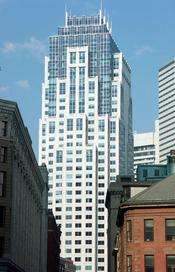kz1000ps
Senior Member
- Joined
- May 28, 2006
- Messages
- 8,973
- Reaction score
- 11,742
(formerly "One Federal bought for $514 million")
Tishman Speyer closes on One Federal acquisition
Boston Business Journal - 2:41 PM EDT Monday
Tishman Speyer closed on its $514 million acquisition of the office tower located One Federal St. from Jamestown.
Jamestown, a real estate investment and management company with offices in Atlanta and Cologne, Germany, was advised by New York's ING Clarion. The sale transaction was brokered by Cushman & Wakefield of Massachusetts Inc.
The acquisition of the 1.1 million-square-foot, 38-story office tower is among the largest investment sale deals in Boston this year. The tower is 99 percent leased and lists tenants such as Bank of America, State Street Corp., Credit Suisse First Boston, Bear Stearns and Fidelity Investments.
The building was initially completed in 1976 as the headquarters for Shawmut Bank and thoroughly renovated and modernized in the mid-1990s and upgraded further in the last two years. The property spans a 1.3-acre city block bounded by Federal, Franklin, Devonshire and Milk streets.
Tishman was founded in 1978 and has acquired or developed a portfolio of more than 77 million square feet valued at more than $24 billion. Tishman also owns an interest in another Financial District tower at 125 High St.
Tishman Speyer closes on One Federal acquisition
Boston Business Journal - 2:41 PM EDT Monday
Tishman Speyer closed on its $514 million acquisition of the office tower located One Federal St. from Jamestown.
Jamestown, a real estate investment and management company with offices in Atlanta and Cologne, Germany, was advised by New York's ING Clarion. The sale transaction was brokered by Cushman & Wakefield of Massachusetts Inc.
The acquisition of the 1.1 million-square-foot, 38-story office tower is among the largest investment sale deals in Boston this year. The tower is 99 percent leased and lists tenants such as Bank of America, State Street Corp., Credit Suisse First Boston, Bear Stearns and Fidelity Investments.
The building was initially completed in 1976 as the headquarters for Shawmut Bank and thoroughly renovated and modernized in the mid-1990s and upgraded further in the last two years. The property spans a 1.3-acre city block bounded by Federal, Franklin, Devonshire and Milk streets.
Tishman was founded in 1978 and has acquired or developed a portfolio of more than 77 million square feet valued at more than $24 billion. Tishman also owns an interest in another Financial District tower at 125 High St.

